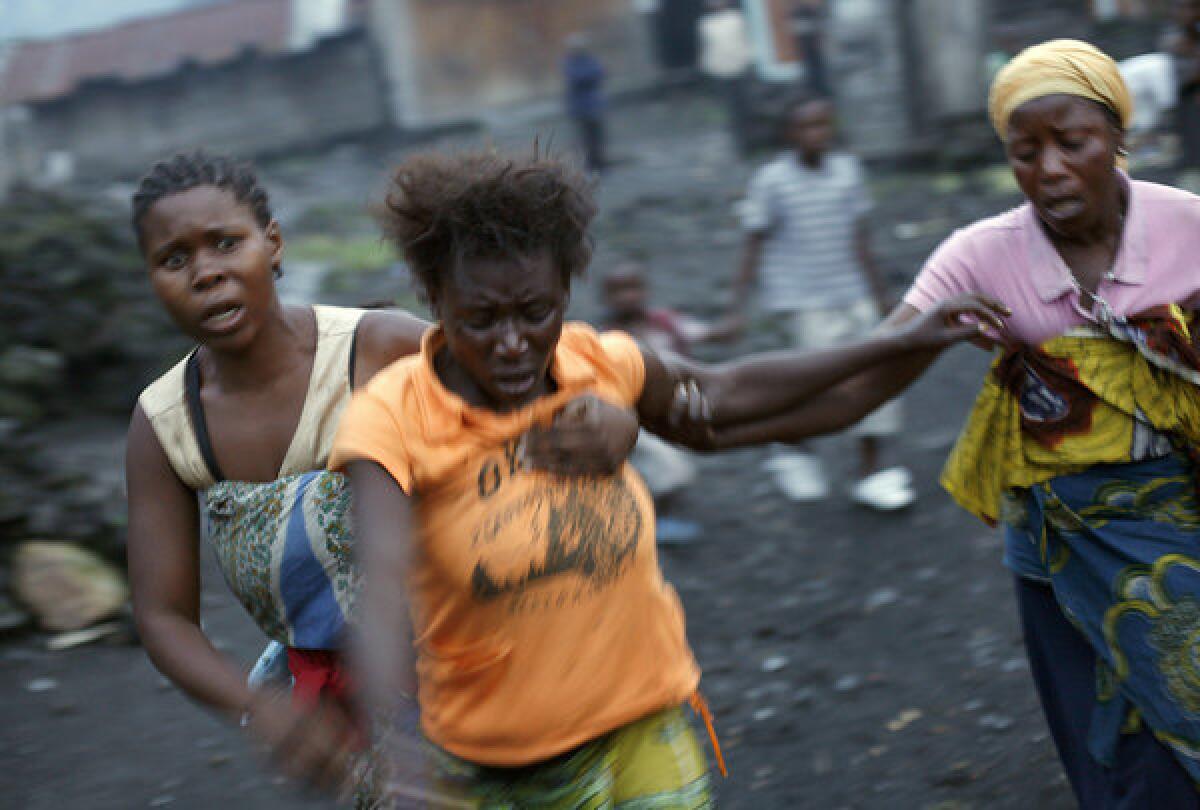Congolese rebels defy regional leaders’ call to leave key city

- Share via
JOHANNESBURG, South Africa — Rebels who this week seized a key city in eastern Democratic Republic of Congo refused to leave Thursday despite pleas from regional leaders including the presidents of Rwanda and Uganda, who were named in a United Nations report as backers of the rebellion.
Congolese President Joseph Kabila said he was willing to negotiate with leaders of the M23 rebels to resolve their grievances, backing down from his original refusal to hold talks. The reversal was widely seen as a sign of his military impotence after troops abandoned the city of Goma on Tuesday without a fight.
The guerrillas broke away in April from another rebel group that had come to terms with the government in 2009, with the M23 maintaining that Kabila’s administration had not lived up to the bargain. Their rebellion has brought fresh chaos to a region that has been riven by warfare for two decades, leaving millions of people dead and civilians vulnerable to abuse. It has also brought fresh charges that neighboring Rwanda is interfering, not only to protect its own border but also to tap eastern Congo’s mineral riches.
The capture of Goma and the M23’s threats to continue its advance leave Kabila severely weakened and at risk of losing control over a large expanse of his nation.
Kabila, Ugandan President Yoweri Museveni and Rwandan President Paul Kagame on Wednesday called on the M23 rebels to leave Goma after a meeting of the leaders in Kampala, Uganda’s capital.
But a rebel spokesman, Vianney Kazarama, rejected the call Thursday and told the Associated Press that the M23 forces planned to take a second major strategic eastern city, Bukavu. On Wednesday, the rebels had even vowed to march 1,000 miles through jungle to seize the Congolese capital, Kinshasa.
“We are not stopping at all,” Kazarama said. “The determination is the same. Whatever happens in Kampala does not affect us.”
However, he said Sultani Makenga, an M23 commander, was traveling to Kampala on Thursday to meet the three leaders.
Thousands of people fled fighting around the town of Sake, near Goma, during the day as government forces put up resistance to the rebels, Reuters news service reported, quoting Kazarama as saying, “It’s no problem, it’s just war.”
According to the United Nations, the M23 rebels have received arms from Uganda and Rwanda and are under the command of Rwandan military officials. The support allowed a militia that began with several hundred men to transform itself within the space of half a year into a major force capable of routing the Congolese military.
On Thursday, British officials said the evidence in the U.N. report was “credible and compelling.”
“All such support is unacceptable, damaging to the security of the region, and in direct contravention of U.N. Security Council 2076, which demands that any and all outside support to the M23 cease immediately,” said British Foreign Secretary William Hague in a statement. He said Britain would take Rwanda’s actions into account in future decisions on aid.
Britain, the United States. and many European countries suspended aid to Rwanda midyear over reports of its involvement in the rebellion. Britain later released some assistance and is due to make a decision next month on $33 million in aid.
Until the current crisis, Rwanda had been a darling of the West, seen as one of the success stories in central Africa, having overcome its genocidal past to emerge as a small but strong regional power. But the U.N. report released Wednesday linking Rwanda to the M23 — just months before Rwanda is due to join the Security Council as a rotating member — highlights that country’s role in undermining stability in eastern Congo and adds fuel to accusations that Rwanda benefits from illegal smuggling of minerals from the conflict zone.
Global Witness, an international nongovernmental organization that highlights trade in conflict diamonds, has accused Rwanda of acting as the main export route for minerals from the troubled eastern region, claims that Rwandan officials reject. Rwandan officials also deny supporting the M23.
Many analysts see the M23’s seizure of Goma as a ploy — with a high cost in civilian casualties — to maximize its position in negotiations over its complaint that the government failed to honor a 2009 peace deal that promised various posts to its members.
In a recent blog post, Congo expert Jason Stearns said the farther the M23 moved from Goma, the more reliant they would be on Rwandan support, and the more exposed Rwanda’s involvement would be.
“They have been able to rely on Rwandan (and, to a lesser degree, Ugandan) firepower for operations close to the border, (but) the farther into the interior they get, the harder it will be to mask outside involvement,” he wrote.
But he said the M23’s victory in Goma forced the Congolese government and international players to accept Rwanda as the only party capable of exerting influence in the region.
“This is the magical and perverse logic of the fait accompli,” he wrote. “Of course, this assumes that donors do not change tack and permanently cut aid to Rwanda. But this would not only go against entrenched aid bureaucracies, but also antagonize the only government that can quickly bring an end to the conflict.”
ALSO:
In Myanmar, returning exiles show capacity for forgiveness
Gazans sweep up, head home as truce holds through first day
Judge questions former French leader Sarkozy in fundraising probe
More to Read
Sign up for Essential California
The most important California stories and recommendations in your inbox every morning.
You may occasionally receive promotional content from the Los Angeles Times.










